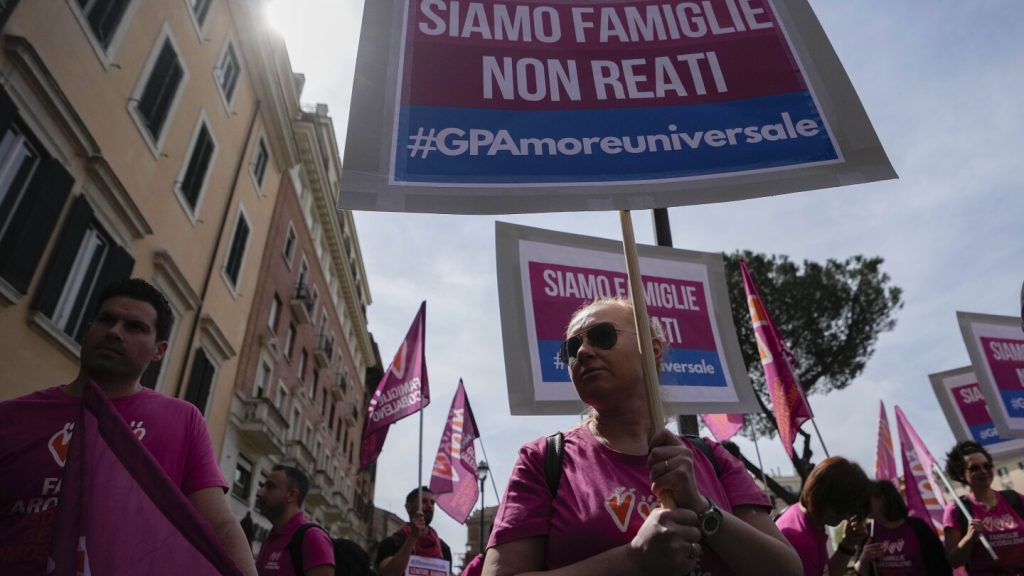Italy criminalized citizens who go abroad to have children through surrogacy, with violators facing up to two years in jail and hefty fines. The ban, extended by a measure promoted by Premier Giorgia Meloni’s far-right party and its conservative coalition partner, is seen as discriminatory towards same-sex couples. The Senate passed the bill 84-58 after a seven-hour debate, making it illegal for Italians to seek surrogacy in countries where it is legal, such as the United States and Canada. This ban applies to all couples, but same-sex advocates argue that it disproportionately affects gay families in a country where only heterosexual couples are allowed to adopt.
In addition to the surrogacy ban, same-sex marriages are also prohibited in Italy, leading LGBTQ+ couples to fight for parental rights for non-biological parents. Lawmakers and activists have protested against the new law, with some holding banners that read “Parents, not criminals.” Opposition lawmaker Riccardo Magi highlighted the negative consequences of protectionism, stating that pushing surrogacy into a legal gray area can lead to exploitation, abuse, and rights violations. Despite the protests, the bill passed in the Senate, signaling Italy’s stance on surrogacy and same-sex partnerships.
Italian citizens who have used surrogacy abroad expressed disappointment at the new law, with one father of two children born through a surrogate mother in the U.S. stating that Italy has missed an opportunity to align itself with global standards. The Catholic Church has been a vocal opponent of surrogacy, with Pope Francis advocating for a universal ban and criticizing the commercialization of pregnancy. However, the Vatican has allowed for the baptism of children born to same-sex parents through surrogacy, showing a nuanced approach to the issue. While commercial surrogacy is common in the U.S., it is banned in parts of Europe, including Italy and Spain, where different regulations are in place.
The criminalization of citizens seeking surrogacy abroad in Italy has sparked debate and criticism both within the country and internationally. The ban, promoted by right-wing parties as a measure to protect women’s dignity, has been condemned as medieval and discriminatory by opponents. LGBTQ+ activists and supporters of same-sex families have raised concerns about the impact of the law on gay couples, who are already limited in their ability to form families through adoption and marriage. Despite the opposition, the bill has passed in the Senate, making it illegal for Italians to engage in surrogacy arrangements in countries where it is legal. The ongoing discussion surrounding surrogacy and LGBTQ+ rights reflects broader societal attitudes towards reproductive rights and family structures.
The ban on surrogacy in Italy reflects a conservative approach to family formation and reproductive rights, with the Catholic Church playing a significant role in shaping public opinion on the issue. While surrogacy is legal and regulated in some countries, including the United States, it remains a contentious topic in many parts of Europe, where concerns about exploitation and commercialization of pregnancy have led to restrictive regulations. The debate surrounding surrogacy and same-sex families is part of a larger conversation about LGBTQ+ rights and equality in a country where traditional family values are deeply ingrained. The criminalization of citizens seeking surrogacy abroad highlights the challenges faced by gay couples in forming families and navigating legal barriers in a society that still upholds traditional views on marriage and parenting.
Overall, the criminalization of citizens engaging in surrogacy abroad in Italy reflects a complex interplay of social, political, and religious factors that shape attitudes towards reproductive rights and LGBTQ+ families. The ban, promoted by right-wing parties as a measure to protect women’s dignity, has been met with criticism and opposition from LGBTQ+ activists and supporters of same-sex families. The passing of the bill in the Senate signals Italy’s stance on surrogacy and same-sex partnerships, highlighting the challenges faced by gay couples in forming families in a society where traditional family values prevail. The ongoing debate surrounding surrogacy and LGBTQ+ rights underscores the need for a more inclusive and progressive approach to family formation and reproductive rights in Italy and beyond.


